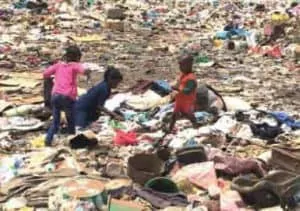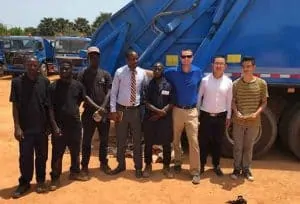

Open dumpsites have a devastating impact on the environment and public health. Waste Management World spoke to James Law, Chair of the ISWA Landfill Working Group and the Task Force on Closing Dumpsites Initiative, about the key steps and economics of closing dumpsites, the climate benefits, and the pros and cons of biomining.
James Law explains that since the operation of a dumpsite does not include the application of daily cover or waste compaction and also it does not have a bottom liner or gas and leachate collection system, the most common risks are groundwater contamination, fire hazards that could generate black carbon fume and toxic gases to impact the air quality and thus affect the public health in the immediate area or areas miles away in downwind direction.
The gas emissions from open dumpsites have a direct impact on climate change. Then there are odor issues, either from the decomposed waste mass itself or from the leachate seep outbreaks located on the side slopes of a dumpsite. The leachate seeps will impact the surface water bodies such as rivers and lakes nearby in the downstream direction as well as the groundwater below the dumpsite. Most dumpsites have people or informal waste pickers on them. Therefore they have a direct impact on their health and safety point of view.
Read and Share the Complete Article and Interview:
Additional Resources:
SWANA recently announced the winners of the SWDC competition hosted by SWANA’s Young Professionals Group. The competition aims at providing design experience to students interested in pursuing an education or career in solid waste management. The outcome is that all participants are winners, gathering real-world experience to help solve complex solid waste management issues in a supportive environment.
Seven universities participated in the competition: Arizona State University, Wayne State University, University of Southern California, University of Vermont, the University of Texas at Arlington, University of British Columbia, and the National University of Engineering in Peru.

“Our team of judges was impressed with how this group of student design teams engaged in understanding this solid waste challenge plaguing The Gambia,” Competition judge and SCS Engineers Project Manager, Chris Jimieson, says. “The students developed diverse designs that we believe will become part of the eventual solution of constructing The Gambia’s first engineered, sanitary landfill.”
The judging panel included John Welch, Director of the Dane County Department of Waste & Renewables; Kaba Bah, Principal Manager at the Midwest GOOH Group in Madison, WI; Lamin Sanyang, Director of Services at Kanifing Municipal Council in The Gambia; and our own Chris Jimieson. The judges have a long association with the Bakoteh Dumpsite.
The SWANA Awards Ceremony features two guest speakers, including David Biderman, CEO and Executive Director of SWANA, and Mayor Talib Ahmed Bensouda, Lord Mayor of the Kanifing Municipality, The Gambia. Mayor Bensouda explains in the video how the Bakoteh Dumpsite became a significant problem for the growing community and the solutions they are using to fix it.
Chris Jimieson provides us with an update from his travels to The Gambia in Africa to evaluate their solid waste challenges.

In October 2020, I presented The Gambia situation as a design project to college students worldwide that wanted to compete in the SWANA YP’s International Solid Waste Design Competition. We asked them to provide a closure plan for the Bakoteh Dumpsite, provide a conceptual design for a new sanitary landfill, and share some cost estimates for each of these endeavors. Seven teams from across the Americas decided to compete. If you are interested, please browse through student design posters, reports, and presentations or contact me, Chris Jimieson.
Thanks to the SWANA YPs, my SCS colleagues, and so many who volunteered to help elevate this project to the international stage.
An open dump refers to a land disposal site where solid waste is disposed of in a manner that does not protect the environment, is susceptible to open burning, and is exposed to the elements, vectors, and scavengers. Therefore, closing or upgrading open dumps to a sanitary landfill is a key issue for many communities worldwide.
In 1976, the passage of U.S. federal legislation known as RCRA pushed for the closure of open dumps and encouraged the development of modern sanitary landfills. In the 1990s, the U.S. EPA issued rules implementing such requirement. As a result, thousands of open dumps were closed.
The informative brochure “Closing Dumpsites,” is intended for many countries that are now beginning down the path to closing them with basic information of the process. Although U.S. dumps have been closed for many years with SCS providing post-closure and long-term care of these facilities, other countries can learn more about the long-term management of these facilities from our professionals nationwide by contacting us at .